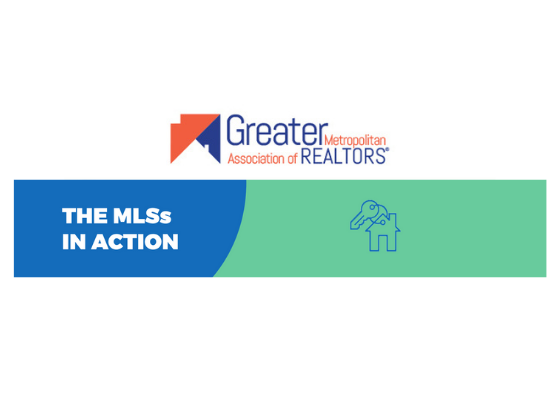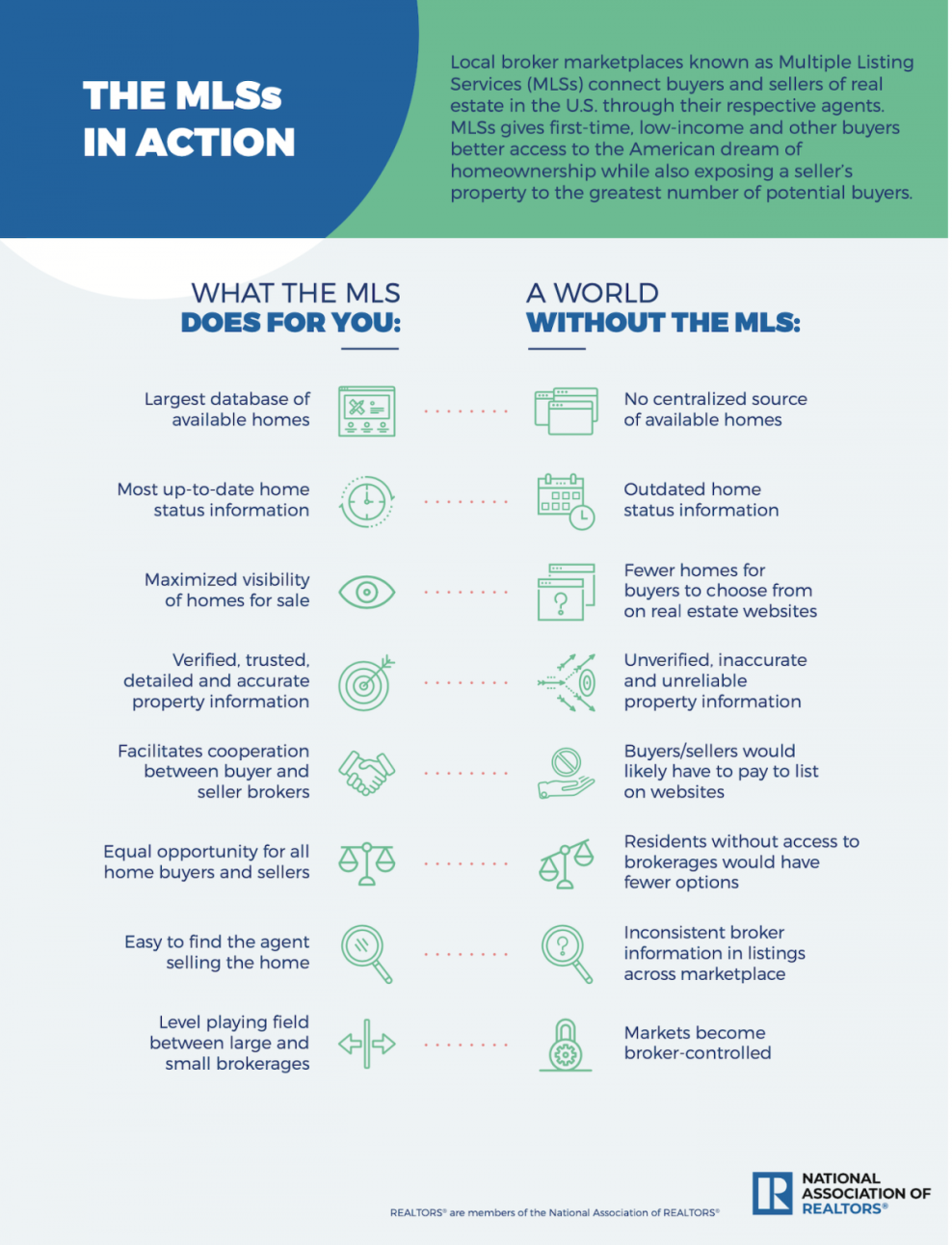
REALTORS® are mostly small business owners who work to ensure buyers and sellers have the greatest access, transparency, and choice through independent, local broker marketplaces that level the playing field for all types and sizes of brokerages.
Local Broker Marketplaces Foster Competition
Independent, local broker marketplaces create highly competitive markets that are friendly to small businesses and new market entrants.
- Local broker marketplaces focus exclusively on residential real estate in local real estate markets.
- Access to inventory and free advertising as well as the practice of the listing broker paying the buyer brokers’ commission incentivizes participation in these local broker marketplaces. The result is the largest, most accessible, and most accurate source of housing information available to consumers.
- That levels the playing field among brokerages, allowing small brokerages to compete with large ones, and provides for unprecedented competition among brokers, including different service and pricing models.
Consumer Access & Opportunity
Local broker marketplaces ensure equity, transparency, and market-driven pricing options for the benefit of home buyers and sellers.
- The U.S. model of local broker cooperation has long been – and is still – viewed as the best value for consumers worldwide.
- Local broker marketplaces provide sellers equal access to the largest possible pool of potential buyers and create the greatest number of housing options for buyers in one place without hidden or extra costs.
- Sellers making offers of compensation to buyer brokers also gives first-time, low/middle-income, and all homebuyers a better shot at affording a home and professional representation.
- The free market organically establishes commission costs within local real estate markets based on service, consumer preference, and what the market can bear, among other things.
REALTORS® Champion Wealth Building & Communities
REALTORS® are everyday working Americans who champion homeownership and property rights for the communities they serve.
- REALTORS® are entrepreneurs and, most often, small business owners who exemplify the spirit of this country.
- As experts, local brokers, REALTORS® help consumers navigate what is for many the most complex and important transaction they’ll ever do.
- A strict code of ethics binds every REALTOR® based on professionalism, consumer protection, and the golden rule.
- REALTORS® also are engaged neighbors committed to building and enhancing the communities they serve and fighting for fair housing.
KEY QUESTIONS ANSWERED
Is there a “set commission” real estate agents charge consumers?
No. The market decides commission rates, and commissions are always negotiable. Consumers have the choice of who they want to pay and how they want to pay them. Because of the pro-consumer local MLS broker marketplace model, and options like a success fee, there is unprecedented competition among real estate agents, especially when it comes to the service and commission options available to consumers.
Why not require buyers to pay commissions directly to their broker instead of the historical practice of listing brokers paying the buyer broker?
Forcing buyers to take on the additional out-of-pocket expense would cause them incredible hardship. It would freeze many, particularly first-time and low- and middle-income homebuyers, out from an already competitive market. That could also force homebuyers to forgo professional help during what is likely the most complex and consequential transaction they’ll make in their lifetime.
How does the U.S. model compare to other international broker marketplaces?
The U.S. approach is the most consumer-centric model. By consolidating fees and the overall process, our nation’s model simplifies the experience, provides greater certainty of success to both buyers and sellers, and provides guidelines that ensure the accuracy of housing inventory made available to real estate professionals and consumers, all at comparable or lower total costs than those in other countries.
Why are MLSs needed when you can find listings for homes in so many places online?
The ability to find listings for homes online is made possible by virtue of local MLS broker marketplaces. Online home listing sites receive the vast majority of their inventory from these local broker marketplaces. That data exists because of real estate professionals' and others’ commitment to cultivating comprehensive housing data reinforced by guidelines that ensure accuracy and transparency so consumers can confidently rely on the information.
What is NAR’s role relative to independent, local MLS broker marketplaces?
NAR provides guidance for independent, local broker marketplaces to ensure pro-consumer, pro-competitive marketplaces that facilitate the sale of real estate where buyers and sellers, and their agents, can work seamlessly and efficiently together. NAR regularly reviews those guidelines to maintain practices that increase transparency and improve the consumer experience. Without that, it would be the Wild West in residential real estate like it is in other countries.
Why should real estate professionals make the money they do in commissions when so much information is available online?
Real estate agents provide essential guidance as consumers navigate the legal, financial, and community aspects of a purchase, including everything from determining property value to negotiating the price. They also make local broker marketplaces, which online housing portals tap into, possible because of all the information they input into those databases. And REALTORS®’ annual income is just $43,330, and 88% are small businesses, a majority of which are women-owned.
How does NAR promote access to homeownership?
Everyone deserves the opportunity of homeownership – it is the American Dream. At NAR, we are working hard to make housing both more affordable and more accessible. This includes incentives to rehabilitate, build and convert properties to affordable housing and a commitment to allowing first-time homebuyers and low-income Americans to afford a down payment and professional representation.
How is NAR promoting equity in homeownership?
NAR is leading the industry in addressing a historically unjust system. Among other things, we advocate for policy change in Washington and increased funding for the Office of Fair Housing and Equal Opportunity. In 2020, we unanimously passed a Fair Housing Action Plan, which engages and mobilizes our 1.5 million REALTORSâ to protect and advance housing in America. Also, local broker marketplaces that REALTORS® and other real estate agents feed into are a critical fair housing tool because they make the majority of inventory in a particular market available to all people regardless of race, income, or other backgrounds.
How do real estate professionals advance the economy?
Homeownership benefits individuals and communities. Homeownership is the most common way the average family builds generational wealth – and, in turn, closes the gap between the rich and poor. Every home sale generates roughly $88,000 in local economic activity accounting for nearly 18% of the nation’s GDP, and every two home sales supports one American job. Those jobs include the 88% of REALTORS® identifying as small business owners.
What is happening with NAR and the Department of Justice?
In November 2020, NAR and the DOJ came to an agreement where NAR would more explicitly state the spirit and intent of our Code of Ethics and MLS guidelines with members in certain key areas. In July 2021, in an unprecedented move, the DOJ said it wanted to back out of that agreement. In September 2021, NAR filed a petition calling for the DOJ to honor its agreement. NAR is living up to its commitments – we simply expect the DOJ to do the same.
How has NAR moved forward on what it agreed to with the DOJ?
Despite the DOJ’s breach, and as is always NAR’s practice, NAR is considering updates to its guidelines, in this case, to reinforce greater transparency and disclosure of compensation offered to buyer agents, ensure listings aren’t excluded from search results based on the amount of compensation offered to buyer agents and reinforce that local MLS market participants do not represent brokerage services as free.
What’s happening with class-action lawsuits challenging how local broker marketplaces work?
Class action attorneys are trying to position themselves for a payout if they can confuse enough people with misinformation and glaring omissions. The U.S. courts have routinely found that local MLS broker marketplaces are pro-competitive and pro-consumer by creating efficiencies and equity in the home buying and selling process.
What’s going on with lawsuits NAR is facing that challenge the Clear Cooperation Policy?
The Clear Cooperation Policy advances equal opportunity in housing by ensuring listings are widely available and accessible to all consumers and requires MLS participants to submit their listings within one business day of marketing the property to the public. Without the protection from the CCP, consumers would be disadvantaged because agents could refuse to give agents or customers access to those listings.
What is NAR’s thoughts on a certain industry participant who is regularly attacking NAR?
They are cloaking their true intentions in misleading claims of consumerism. The reality is that how commissions work in the U.S. and NAR’s guidelines give everyday Americans and small businesses critical advantages they otherwise wouldn’t get. That industry participant
